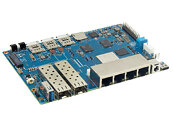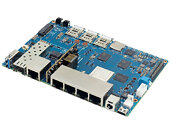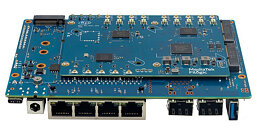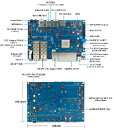Banana Pi recently released the specifications of their upcoming BPI-R4 router SBC with a host of new connectivity and features over the last generation BPI-R3. The new BPI-R4 adds dual 10GbE via the SFP ports, with a second board design offering 10GbE+2.5GbE instead, as well as a large daughterboard addon that enables 36 Gbps tri-band WiFi 7 and fits to a pair of mPCIE connectors on the bottom. There is also now support for 5G cellular via a M.2 B-Key port laid over the top of a trio of NanoSIM card slots. Enabling this improvement in connectivity is the updated MediaTek 'Filogic 880' MT7988A SoC which features four Cortex-A73 cores at 1.8 GHz as well as a host of dedicated improvements specifically tuned for high speed networking which combines most functions into the single SoC. Now instead of surrounding the main processor with a host of co-processing chips like the BPI-R3 did, the BPI-R4 simply surrounds the SoC with 8 GB of DDR4 and an 8 GB eMMC flash module. The remaining wireless logic now lives on the NIC daughterboard. The BPI-R4 does give up one of its gigabit RJ-45 ports despite the topside space savings, but reuses this empty space by offering an optional plug-in POE module, and both a 12 V power input as well as 20 V USB-PD with the added Type-C port.
Features retained from previous generations are the M.2 M-Key for SSD storage expansion, a microSD card slot, rear facing USB 3.2 Type-A, the bootstrap toggle switch, and 26-pin GPIO. The BPI-R4 retains roughly the same physical dimensions as the BPI-R3 except for the additional height from the WiFi 7 module which hugs the bottom of the main board when installed. The BPI-R4, like its predecessors, will support Debian Linux and OpenWRT at launch with images available on the Banana Pi wiki product page. Banana Pi hopes to launch the BPI-R4 by Q1 2024 and has yet to announce any pricing. Our hope is that pricing stays roughly in line with the BPI-R3 which launched at just shy of $90 USD. Given the swath of new technologies on the BPI-R4 it's a fair guess that it is going to be over the $100 mark.




View at TechPowerUp Main Site
Features retained from previous generations are the M.2 M-Key for SSD storage expansion, a microSD card slot, rear facing USB 3.2 Type-A, the bootstrap toggle switch, and 26-pin GPIO. The BPI-R4 retains roughly the same physical dimensions as the BPI-R3 except for the additional height from the WiFi 7 module which hugs the bottom of the main board when installed. The BPI-R4, like its predecessors, will support Debian Linux and OpenWRT at launch with images available on the Banana Pi wiki product page. Banana Pi hopes to launch the BPI-R4 by Q1 2024 and has yet to announce any pricing. Our hope is that pricing stays roughly in line with the BPI-R3 which launched at just shy of $90 USD. Given the swath of new technologies on the BPI-R4 it's a fair guess that it is going to be over the $100 mark.




View at TechPowerUp Main Site





 .
.